高中英语-情态动词课件(2课时)(67张ppt)
文档属性
| 名称 | 高中英语-情态动词课件(2课时)(67张ppt) |
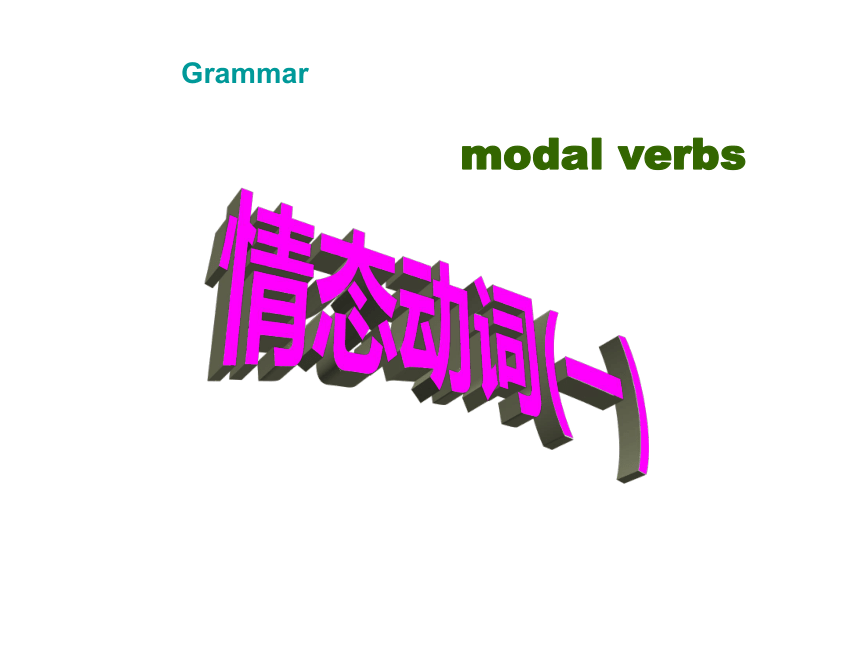
|
|
| 格式 | zip | ||
| 文件大小 | 672.0KB | ||
| 资源类型 | 教案 | ||
| 版本资源 | 通用版 | ||
| 科目 | 英语 | ||
| 更新时间 | 2021-01-22 00:00:00 | ||
图片预览

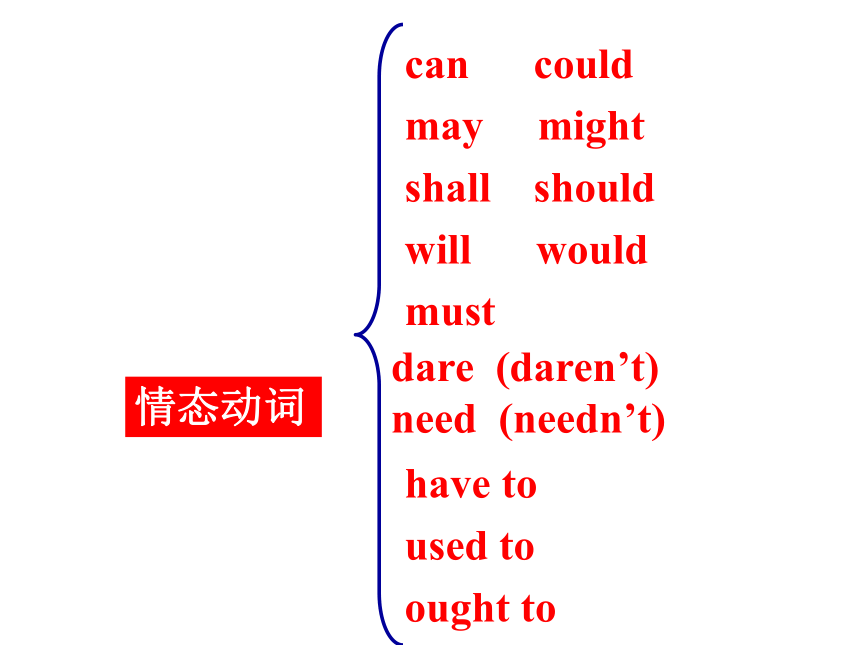
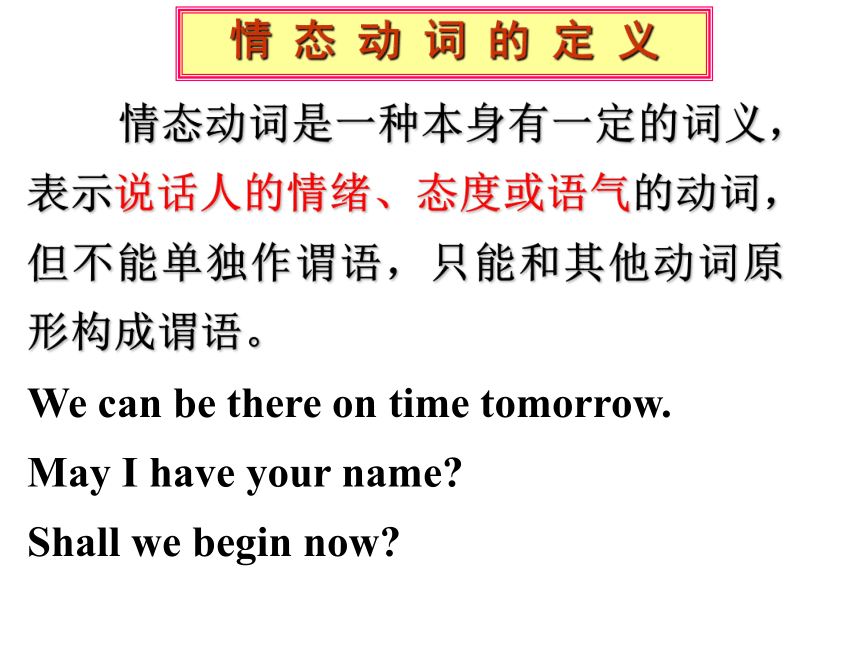

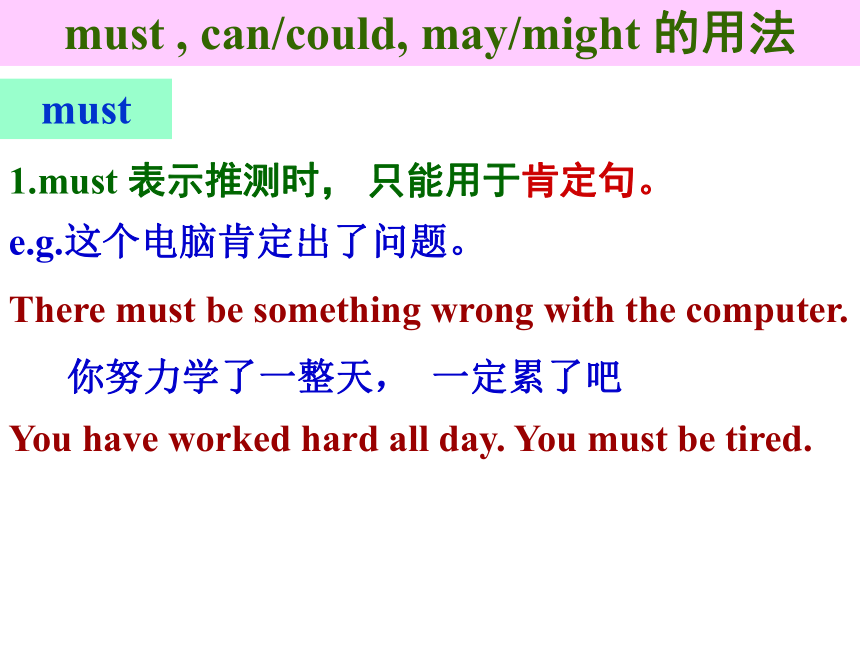
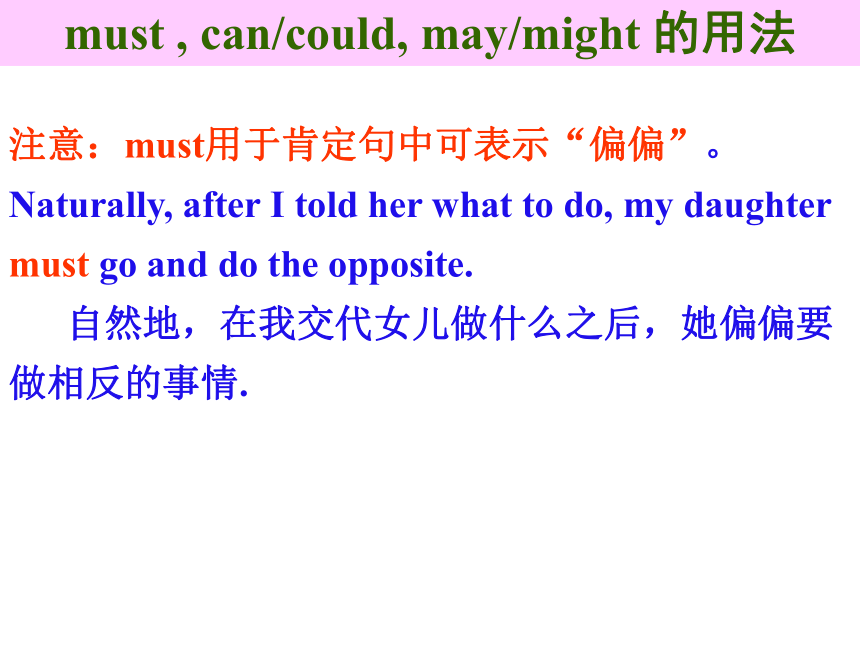

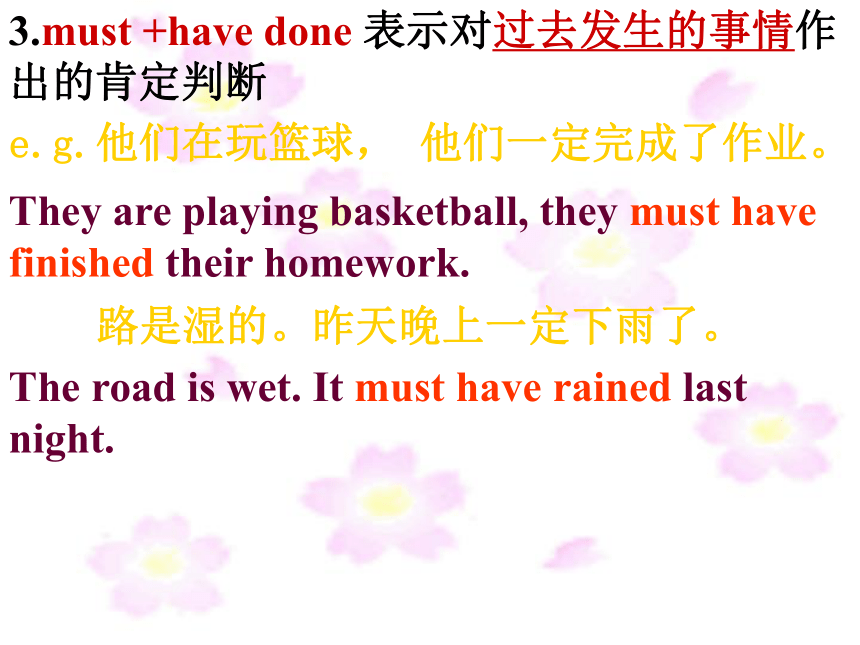
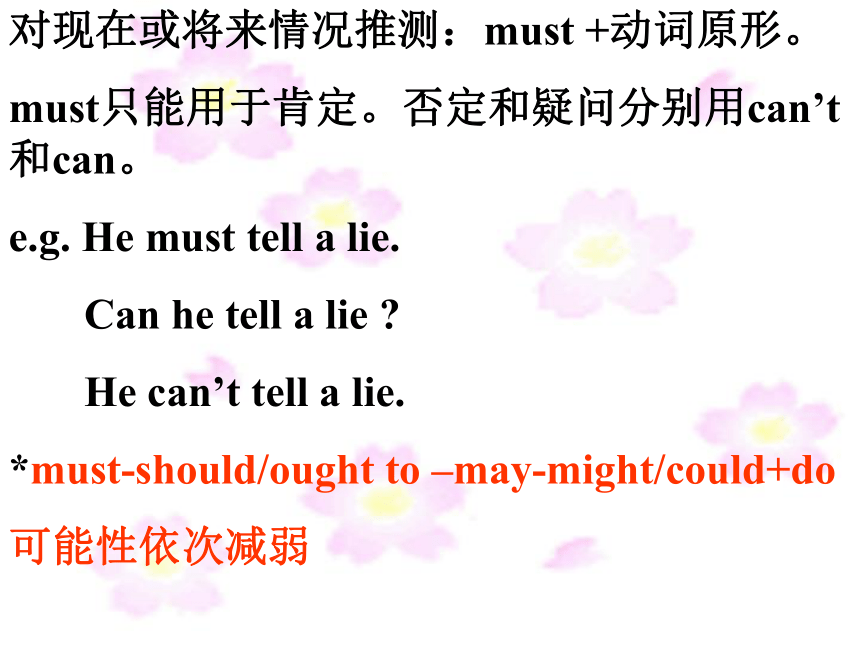
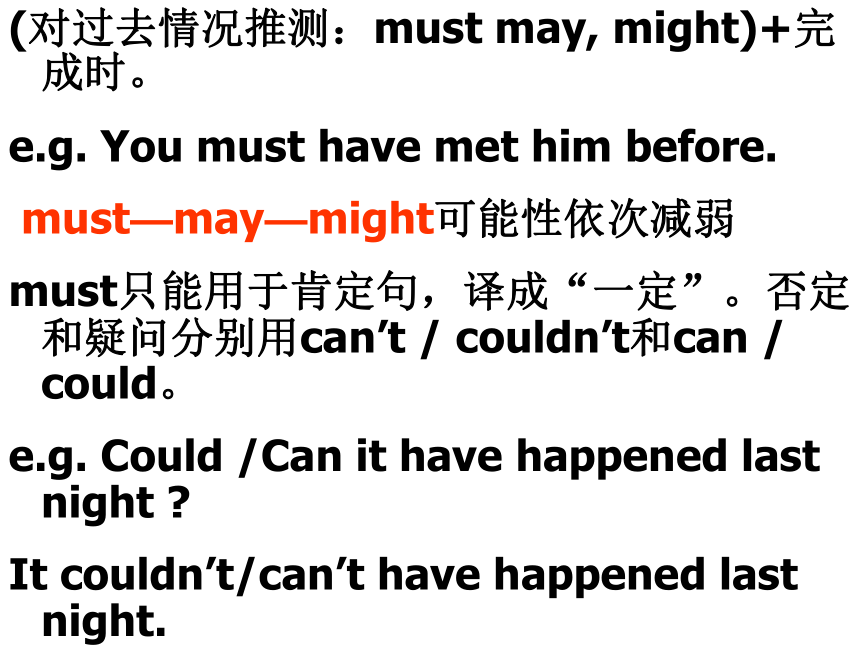
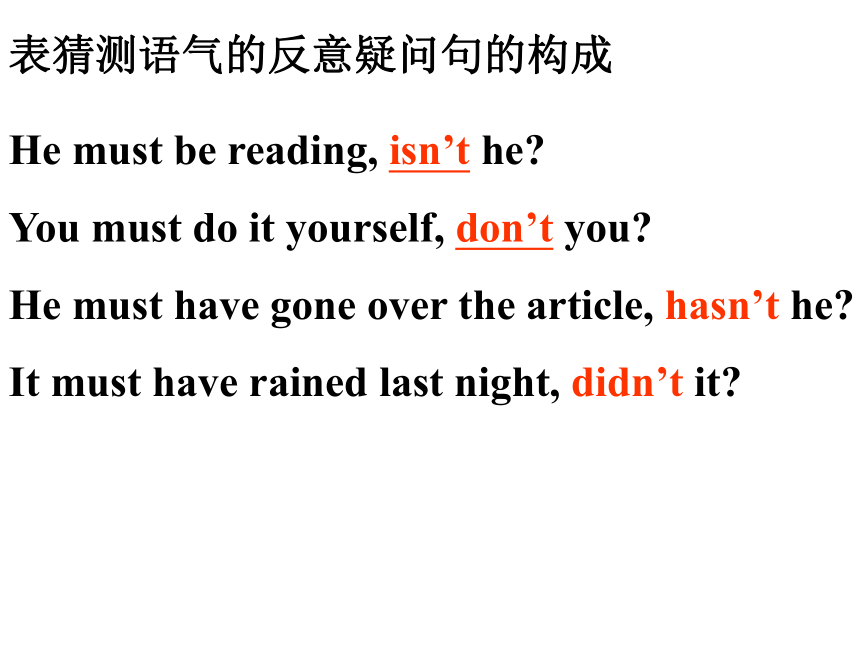
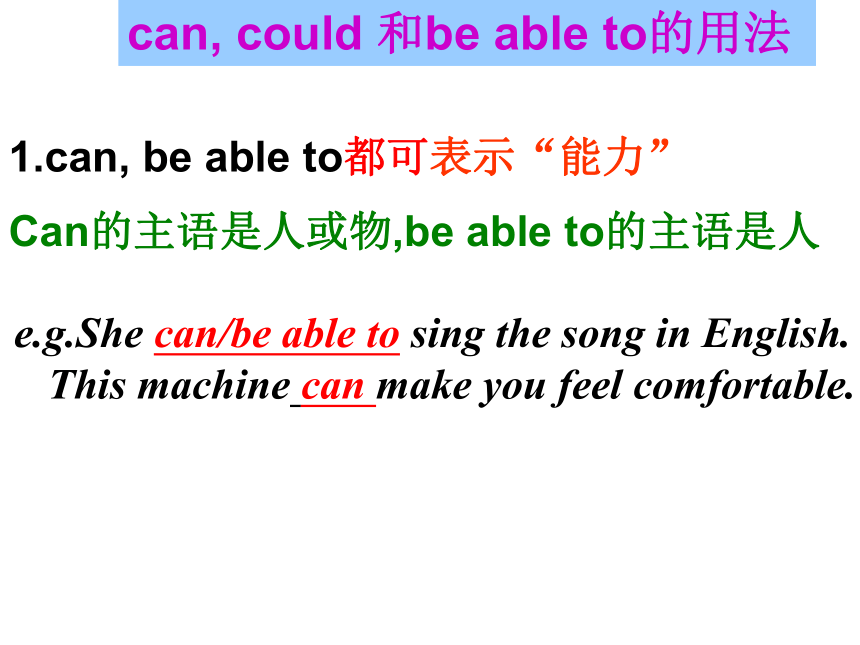
文档简介
(共67张PPT)
modal
verbs
Grammar
情态动词
can
could
may
might
shall
should
will
would
must
have
to
used
to
ought
to
dare
(daren’t)
need
(needn’t)
情
态
动
词
的
定
义
情态动词是一种本身有一定的词义,表示说话人的情绪、态度或语气的动词,但不能单独作谓语,只能和其他动词原形构成谓语。
We
can
be
there
on
time
tomorrow.
May
I
have
your
name?
Shall
we
begin
now?
You
must
obey
the
school
rules.
情态动词无人称和数的变化,情态动词后面跟的动词需用原形,否定式构成是在情态动词后面加“not”。个别情态动词有现在式和过去式两种形式,过去式可以用来表达更加客气、委婉的语气,时态性不强,可用于过去,现在或将来.
情
态
动
词
的
特
点
must
,
can/could,
may/might
的用法
must
1.must
表示推测时,
只能用于肯定句。
e.g.这个电脑肯定出了问题。
There
must
be
something
wrong
with
the
computer.
你努力学了一整天,
一定累了吧
You
have
worked
hard
all
day.
You
must
be
tired.
must
,
can/could,
may/might
的用法
注意:must用于肯定句中可表示“偏偏”。
Naturally,
after
I
told
her
what
to
do,
my
daughter
must
go
and
do
the
opposite.
自然地,在我交代女儿做什么之后,她偏偏要做相反的事情.
2.must
+be
doing/do
表示对现在的动作进行肯定推测
e.g.他现在一定在看小说.
He
must
be
reading
novels
now.
他们买了一辆新车。
他们一定很有钱.
They
have
bought
a
new
car.
They
must
have
a
lot
of
money.
3.must
+have
done
表示对过去发生的事情作出的肯定判断
e.g.他们在玩篮球,
他们一定完成了作业。
They
are
playing
basketball,
they
must
have
finished
their
homework.
路是湿的。昨天晚上一定下雨了。
The
road
is
wet.
It
must
have
rained
last
night.
对现在或将来情况推测:must
+动词原形。
must只能用于肯定。否定和疑问分别用can’t和can。
e.g.
He
must
tell
a
lie.
Can
he
tell
a
lie
?
He
can’t
tell
a
lie.
must-should/ought
to
–may-might/could+do
可能性依次减弱
(对过去情况推测:must
may,
might)+完成时。
e.g.
You
must
have
met
him
before.
must—may—might可能性依次减弱
must只能用于肯定句,译成“一定”。否定和疑问分别用can’t
/
couldn’t和can
/
could。
e.g.
Could
/Can
it
have
happened
last
night
?
It
couldn’t/can’t
have
happened
last
night.
He
must
be
reading,
isn’t
he?
You
must
do
it
yourself,
don’t
you?
He
must
have
gone
over
the
article,
hasn’t
he?
It
must
have
rained
last
night,
didn’t
it?
表猜测语气的反意疑问句的构成
can,
could
和be
able
to的用法
e.g.She
can/be
able
to
sing
the
song
in
English.
This
machine
can
make
you
feel
comfortable.
1.can,
be
able
to都可表示“能力”
Can的主语是人或物,be
able
to的主语是人
can,
could
和be
able
to的用法
e.g.
We’ll
be
able
to
finish
the
work
soon.
I
haven’t
been
able
to
see
the
film.
2.can只用于现在时和过去时(could)。
be?able?to可以用于各种时态。
could用于表示泛指过去的能力。
e.g.
I?could?read?when?I?was?four.
Although
the
soldier
was
badly
wounded,
he
was
able
to
tell
what
had
happened.
3.表示特定的某一过去能力或表示成功地做了某事时,只能用was/were?able?to,?不能用could。
e.g.
He?was?able?to?escape
from?Europe?before?
the?war?broke?out.
??
He?was?able?to?swim?before?he?got?tired.
表示过去的能力
can/could
1.
can
/could
表示推测时,只能用在否定句或疑问句中。
e.g.
It’s
so
late.
Can
Tom
be
reading?
Can
it
be
Mr.
Green?
这个人不可能是玛丽,
她生病了。
It
can’t
be
Mary.
She
has
fallen
ill.
她不可能在说谎。
She
couldn’t
be
telling
lies.
在疑问句中
could
比can
更有礼貌,在此不是can的过去式。
e.g.
Can
you
wait
a
moment
please?
Liz,
can
you
do
me
a
favor?
Excuse
me,
could
you
tell
me
the
way
to
the
station?
I
wonder
if
you
could
help
me.
(请求)
2.
can/could
have
done
对过去发生行为的可能性进行推测:
刚才我还看见他了,
所以他不可能出国的。
I
saw
him
just
now
so
he
couldn’t
have
gone
abroad.
门是锁着的,
所以她不可能在家。
The
door
was
locked.
She
couldn’t
have
been
at
home.
3.
can/could
have
done
“本可以,本来可能已经”用于肯定句中,表示对过去发生的事情做出的判断.
e.g.你本来可以考的更好。
You
could
have
had
a
better
mark.
may/might
1.may/might表示推测时,只能用于陈述句,表示对现在或将来要发生的动作把握不大。
e.g.她们明天可能会到这里来。
They
may
come
here
tomorrow.
他们可能还在等我们呢。
They
may
be
still
waiting
for
us.
2.might
可用于指过去的行为或者表示可能性更小。
e.g.他也许在做功课吧。
He
might
be
doing
his
homework
now.
我问他我是否可以离开。
I
asked
him
if
I
might
leave.
I
asked
him
“May
I
leave
now?”
3.might/may
have
done,表示对过去发生的动作进行可能性推测。
e.g.他可能去医务室了。
He
may
have
gone
to
the
clinic.
他可能已经从报纸上知道这个消息了。
He
might
have
read
about
the
news
in
the
newspaper.
4)may
表示许可,表示允许别人做某事,
也可征求对方的许可。
May
I
open
the
door?
We
may
keep
the
book
for
two
weeks.
5)
用于祈使句,表示祝愿。
May
you
succeed!
May
you
have
a
nice
trip!
表示推测——情态动词的重要用法.
肯定的推测
可能的推测
否定的推测
疑问的推测
must
对将来
对现在
对过去
情态动词
may,
might
can’t,
couldn’t
can,
could
+
V.
+
V.
+
have
done
常见must
be
+
be
doing
+
V.
+
V.
+
have
done
+
be
doing
可以用not表示“可能不”
+V.
+
V.
+
have
done
+
be
doing
+
V.
+
V.
+
have
done
+
be
doing
Will
/Would
you
do…?
(表请求would
更委婉)表意志,愿望,决心
would表过去反复发生的动作或某种倾向
“总是,总要”
used
to表过去常常(现在已没有这种习惯)
“过去常常”
used
to
可于状态动词连用 would不可以
e.g.
He
used
to
be
a
quiet
boy.
( )
He
would
be
a
quiet
boy.
(
)
√
×
will/would
shall/should
1.shall
用于第二、三人称陈述句中,表示说话人给对方的命令,警告,允诺或威胁。
e.g.1)You
shall
go
with
me.(命令)
2)You
shall
have
the
book
when
I
finish
it.(允诺)
3)He
shall
be
punished.(威胁)
2.
shall用于第一、三人称疑问句中,表示说话人征求对方的意见和向对方请示。
e.g.4)Shall
we
begin
our
class?(征求意见)
5)When
shall
Mike
be
able
to
leave
hospital?(请示)
3.用于条约,规定,规章等文件中,表示一种义务,多用于第三人称中。
6)
“The
interest
___be
divided
into
five
parts,
according
to
the
agreement
made
by
both
sides.”
declared
the
judge.
A.
may
B.
should
C.
must
D.
shall
用于表达合理推断。
e.g.
It
is
three
o’clock,
the
football
game
should
begin
now.
Mary
took
dancing
lessons
for
years,
she
should
be
an
excellent
dancer.
2.
should
的用法
2.
should
的用法
注意:should可表示“居然,竟然”。
e.g.我不敢相信这样一个绅士居然对老人如此无礼。
I
can’t
believe
such
a
gentleman
should
be
so
rude
to
the
old.
e.g.
Young
people
should
learn
how
to
use
computers.
Every
citizen
ought
to
obey
law.
You
ought
not
to
go.
3.
should常表示劝告、建议、命令,与ought
to意义相近,但ought
to多表示责任、义务,语气强烈。在疑问句中通常用should代替ought
to。
e.g.
You
should/ought
to
have
told
her
the
truth
earlier.
She
shouldn’t
have
left
without
saying
a
word.
4.should/ought
to
have
done表示责备或批评,意为“本应该做到…但没有做到…”,用于否定则表示“本不该…但”ought
to的语气更强烈.
must
和have?to
1.must用于一般问句中,肯定回答用must否定式用?needn’t或don’t
have
to,做?“不必”,mustn’t表示“禁止,不允许”
?e.g.—
Must?I?finish?all?assignments?at?a?time?
??—Yes,
you
must.
No,?you?needn't.
You?mustn’t?get?off?while?the?car?is?still?
moving.
e.g.
I
don’t
like
this
TV
set.
We
must
buy
a
new
one.
There
was
no
more
bus.
They
had
to
walk
home.
2.表示“必须”这个意思时,must?和have?to?稍有区别。must着重说明主观看法,have?to?强调客观需要。另外,have?to?能用于更多时态。
need
/dare
a.
need
表需要和必须常用于否定句和疑问句,needn’t
have
done
“本不必做…”
b.
dare
表敢,常用于否定句,疑问句和条件句中。
c.
dare与need
用做实意动词时有时态,人称和数的变化,但dare用于否定句和疑问句时常接不带to的不定式,need后要接带to的不定式。
1.
I
don't
know
where
she
is,
she
_______
be
in
Wuhan.
2.
At
this
moment,
our
teacher
________________
our
exam
papers.
这时,我们老师想必在批改试卷。
3.
The
road
is
wet.
It
________________
last
night.
(rain)
4.
Your
mother
______________________
for
you.
你妈妈一定一直在找你。
may
must
be
marking
must
have
rained
must
have
been
looking
5.
Philip
________________________
seriously
in
the
car
accident.
菲利普可能在车祸中受了重伤.
6.
---Linda
has
gone
to
work,
but
her
bicycle
is
still
here.
---She
_____________________
(go)
by
bus.
7.
Mike
________________
his
car,
for
he
came
to
work
by
bus
this
morning.
迈克一定还没有找回他的车,因为早上他是坐
公共汽车来上班的。
may
(might)
have
been
hurt
may
(might)
have
gone
can’t
have
found
Practice
2:表示推测——情态动词的重要用法.
1.
You
must
be
Mr
Smith----I
was
told
to
expect
you
here.
2.
He
must
have
known
what
we
wanted.
3.
We
may
have
read
the
same
report.
4.
He
can’t
have
slept
through
all
that
noise.
5.
There’s
someone
outside----who
can
it
be?
6.
What
can
they
be
doing?
7.
These
pills
might
help
to
cure
your
disease.
8.
You
could
be
right,
I
suppose.
modal
verb
Grammar
should
&
ought
to
should
可指“竟然”讲
e.g.
You
ought
to
help
him
because
he
is
in
trouble
now.(语气强,有命令意味。)
You
should
have
a
rest
after
finishing
your
sports.(一般性建议)
You
ought
to
call
the
police
when
you
find
something
wrong
in
your
house.
He
should
take
care
of
the
babies
tonight.
ought
to
的否定式:He
oughtn’t
to
do
it.
ought
to
的疑问句:Ought
we
to
do
it
at
once?
反意疑问句里:
He
ought
to
be
here,
oughtn’t
he?
ought
to
表应该,ought
to
语气>should
shouldn’t
he?
I’m
surprised
that
he
should
eat
so
little
every.
have
to
have
to
表示客观需要去做的事情,意为“必须,不得不。”
e.g.
I
have
to
get
the
station
early
to
catch
the
first
train.
We
missed
the
bus
so
we
had
to
walk
home.
We
have
to
overcome
all
kinds
of
difficulties.
have
to
有多种时态。常见的有:
一般将来时
We
will
have
to
gather
at
the
school
gate
at
7
tomorrow.
一般现在时
I
have
to
take
more
money
with
me
because
my
wife
has
so
much
to
buy.
一般过去时
Finally,
we
had
to
give
up
our
idea
to
hold
a
picnic
outside
as
it
rained
for
a
whole
afternoon.
have
to
(考点)
Need
I
do
…?
Yes,
you
must.
No,
you
needn’t.
dare
&
need
情态动词
实义动词
dare
否,疑,条
dare
not
do
否,疑don’t
dare
to
do
don’t
dare
do
不用于肯定句
肯:dare
to
do
need
否,疑
needn’t
do
(don’t)
need
sth
(don’t)
need
to
do
肯:must,
have
to,
ought
to,
should
Must
they
do…?
Yes,
they
must.
No,
they
needn’t/don’t
have
to.
must
&
have
to
must
have
to
主观/客观
主观
客观
时态
现在,将来
多种
表推测
√
×
询问意愿
√
×
否定意
禁止,不允许
不必
must表主观意志,而have
to表由于客观因素不得不做完成的事情。
must没有过去式,除在间接引语中可表示过去的时间。在直接引语中表示过去的时间用had
to代替。
e.g.
I
told
her
that
she
must
give
up
smoking.
She
said,
“We
had
to
get
everything
ready
that
night.”
比较must
&
have
to
注意对need问句的回答:
--Need
I
finish
the
work
today?
--Yes,
________________.
No,
________________.
No,
________________.
you
must
you
needn’t
you
don’t
have
to
needn’t
对其它情态动词的回答:
--Shall
I
tell
John
about
it?
--No,
you
__________.
--Must
we
do
it
now?
--No,
you
__________.
needn’t
(don’t
have
to)
needn’t
(don’t
have
to)
Could
I
borrow
your
dictionary?(委婉)
----
Yes,you
can/may.
Sure.
Go
ahead.
Please
yourself.
May
I
take
this
seat?(第一人称疑问句)
Yes,
you
may.
No,
you
mustn’t.
Practice
1:
高考考题专练
1.
I
thought
you
_____like
something
to
read,
so
I
have
brought
you
some
books.
A.
may
B.
might
C.
would
D.
must
2.
Where
is
my
pen?
I
____it.
A.
might
lose
B.
would
have
lost
C.
should
have
lost
D.
must
have
lost
3.
I
didn’t
hear
the
phone.
I
___asleep
A.
must
be
B.
must
have
been
C.
should
be
D.
should
have
been
B
D
B
4.
---There
were
already
five
people
in
the
car,
but
they
managed
to
take
me
as
well.
----It
____a
comfortable
journey
A.
can’t
be
B.
shouldn’t
be
C.
mustn’t
have
been
D.
couldn’t
have
been
5.
It’s
nearly
seven
o’clock
.
Jack
___be
here
at
any
moment.
A.
must
B.
need
C.
should
D.
could
D
C
情态动词考题:
1.
---Did
the
train
arrive
in
time?
----No.
It
_______
two
hours
ago.
A.
must
have
arrived
B.
ought
to
have
arrived
C.
must
arrive
D.
ought
to
arrive
2.
"Must
I
drive
to
his
house
and
pick
up
the
children?"
?
"No,
???????
."
?
A.
you
shouldn't?
B.
you
might
not
?
C.
you
needn't
?
D.
you
mustn't
B
C
3.
We
didn't
see
Tom
at
the
meeting
yesterday.
He
???????
it.
?
A.
mustn't
have
attended?
B.
cannot
have
attended
?
C.
needn't
have
attended?
D.
would
have
not
attended
B
4.
You
________
such
a
long
composition.
The
teacher
only
asked
for
300
words.
You
have
written
600.
A.
mustn’t
have
written
B.
couldn’t
have
written
C.
needn’t
have
written
D.
do
not
have
to
write
C
5.
There
is
someone
knocking
at
the
door.
???????
it
be
Tom?
?
A.
can?
B.
must?
C.
should?
D.
ought
to
6.
Two
years
ago,
my
husband
bought
me
a
bicycle.
If
you
live
in
town,
it
is
often
faster
than
a
car
and
you
???????
worry
about
parking.
??
A.
must
not??
B.
may
not??
C.
should
not??
D.
don't
have
to
A
D
1.Judging
from
his
accident,
he
must
be
from
the
south,
2.Tom
bought
a
lot
of
apples.
He
must
like
eating
apples,
3.It
is
eleven
o’clock
at
night
and
the
lights
are
off.
They
must
be
sleeping
now,
isn’t,
he?
didn’t
he?
aren’t
they?
因must后是实意动词like
因must后是系动词
be
must后接的是be
sleeping,是对正在进行的情况推测
1.We
must
have
learned
2,000
words
by
the
end
of
last
term,
hadn’t
we?
3.He
must
have
gone
to
Beijing,
didn’t
it?
hasn’t
he?
若句中含有过去完成时的时间状语,用过去完成时完成反意疑问句
若句中含有过去的时间状语,用一般过去时完成反意疑问句
若句中不含任何时间状语,
用现在完成时完成反意疑问句
2.It
must
have
rained
last
night,
for
the
road
was
very
muddy,
must
+have
done
表示对过去已经发生的行为进行推测,意为“想必/准是/一定作了某事”。
1.It
must
have
rained
last
night,
for
the
road
was
very
muddy.
昨晚
一定是下雨了,
因为地上很泥泞。
2.We
must
have
learned
2,000
words
by
the
end
of
last
term.
到上学期为止我们一定学了有两千个单词
。
3.He
must
have
gone
to
Beijing.
他一定已经去北京了。
can/could+have
done表示对过去的行为的怀疑和不肯定,通常用在否定句和疑问句中。
1.
Can
they
have
won
the
basketball
match?
他们可能赢了篮球赛吗?
2.
It
couldn’t
have
been
Mr.
Green.
He
has
gone
to
New
York.
那不可能是格林先生的,他已经去北京了。
may/might+have
done表示对过去已发生行为的推测,意为“也许/或许已经…”。一般只用于肯定句和否定句中,不用与疑问句。might比may更委婉、含蓄和不肯定。
1.
It’s
too
late.
I
think
he
may
have
gone
to
bed.
太晚了,我想他可能已经睡觉了。
2.
He
may/might
not
have
finished
the
work.
他可能没有完成工作。
巩
固
练
习
1.---What
____
it
be?
---It
____
be
a
mail
box,
for
it
is
moving.
It
___
be
a
car.
A.
can;
can’t;
must
B.
can;
can;
must
C.
can;
mustn’t;
must
D.
must;
mustn’t
can
2.
---Isn’t
that
Ann’s
husband
over
there?
---No.
it
____
be
him---I’m
sure
he
doesn’t
wear
glasses.
A.can’t
B.
must
not
C.
wont
D,
may
not
3.---When
can
I
come
for
the
photos?
I
need
them
tomorrow
afternoon.
---They
____
be
ready
by
12:00.
A.
can
B.
should
C.
might
D.
need
4.---are
you
coming
to
Jeff’s
party?
---I’m
not
sure.
I
___
go
to
the
concert
instead.
A.
must
B.
would
C.
should
D.
might
A
A
B
D
5.---You
may
laugh,
but
I’ve
been
thinking
of
becoming
a
vegetarian.
---Oh,
you
____
be
out
of
your
mind.
You
will
be
hungry
all
the
time.
A.
will
B.
may
C.
must
D.
should
6.---I
wonder
why
they
are
late?
---They
_____
the
train.
can’t
have
missed
B.
could
miss
C.
must
have
missed
D.
might
miss
7.---Show
me
your
permit,
please!
---Oh,
it’s
not
in
my
pocket.
It
______.
A.
might
fall
out
B.
could
fall
out
C.
should
have
fallen
out
D.
must
have
fallen
out
C
C
D
7.
---Has
Mike
started?
He
said
he
would
join
in
the
party.
---He
____.
He
is
a
man
of
keeping
his
word.
A.
could
have
left
B.
must
have
left
C.
can’t
come
D.
won’t
be
coming
8.Everything
has
two
sides.
Beautiful
songs,
sometimes,
___
be
just
noise
to
others.
must
B.
may
C.
should
D.
could
9.
---There
were
already
five
people
in
the
car,
but
they
managed
to
take
me
as
well.
---It
___
a
comfortable
journey.
A.can’t
be
B.
mustn’t
have
been
C.
should
be
D.
couldn’t
have
been
10.Chinese
must
have
the
largest
number
of
speakers,
____.
A.mustn’t
they
B.
haven’t
they
C.
don’t
they
D.
didn’t
they
B
B
D
C
could(不用can)+have
done,在肯定句中表示“本来能够…而没能…”,具有婉转的批评和责备之意。
1.
I
could
have
passed
my
exam
easily,
but
I
made
too
many
stupid
mistakes.
我本来能够轻易通过考试,但我犯了太多不该
犯的错误。
2.You
could
have
reported
to
me
earlier.
你本该早点告诉我的。
should/ought
to+have
done用于肯定句时,表示“本该做某事而实际上没做”,用于否定句时,则表示“不该做的事反而做了”。
1.You
should
have
told
him
a
week
ago.
你本来应该在一周前告诉他的。
2.You
ought
not
to
have
taken
the
magazine
out
of
the
reading
room.
他不该、把杂志带出阅览室的。
might(不用may)+have
done表示“本来可能…”,但实际上没有发生的事。另外,还可表示“本来应该或可以做某事”之意,含有轻微的责备语气。
1.You
might
not
have
told
her.
你本可以不告诉他的。(事实上你告诉他了)
2.
You
might
have
come
earlier.
你本可以早点来的。(但没有这样)
needn’t
+have
done表示做了本来不必去做的事。
1.She
needn’t
have
gone
to
the
station
yesterday.
昨天她本不必到火车站去的.(昨天她去了)
2.You
needn’t
have
bought
it.
你本可不必买它的。
(你买了)
巩
固
练
习
1.Oh,
I’m
not
feeling
well
in
the
stomach.
I
____
so
much
fried
chicken
just
now.
A.
shouldn’t
eat
B.
shouldn’t
have
eaten
C.
mustn’t
eat
D.
mustn’t
have
eaten
2.---Why
hasn’t
Jane
arrived
yet?
---She
____
again
in
the
morning?
A.
shouldn’t
have
overslept
B.
may
have
turned
off
the
alarm
clock
C.
must
have
no
one
t
o
call
her
D.
should
have
someone
to
wake
her
up
3.---Did
you
go
to
the
movie
the
day
before
yesterday?
----No.
We
___,
but
we
decided
not
to.
A.should
have
gone
B.
could
go
C.
should
go
D.
could
have
gone
B
B
A
4.As
it
turned
out
to
be
a
small
house
party,
we
____
so
formally.
needn’t
dress
B.
didn’t
have
to
dress
up
C.
Might
not
have
dressed
up
D.
needn’t
have
dressed
up
5.I’m
rather
surprised
you
haven’t
reported
him
to
your
teacher.
In
my
opinion,
you
___
this
as
soon
as
you
found
out
he
was
cheating.
must
have
done
B.
might
have
done
C.
should
have
done
D.
could
have
done
D
C
modal
verbs
Grammar
情态动词
can
could
may
might
shall
should
will
would
must
have
to
used
to
ought
to
dare
(daren’t)
need
(needn’t)
情
态
动
词
的
定
义
情态动词是一种本身有一定的词义,表示说话人的情绪、态度或语气的动词,但不能单独作谓语,只能和其他动词原形构成谓语。
We
can
be
there
on
time
tomorrow.
May
I
have
your
name?
Shall
we
begin
now?
You
must
obey
the
school
rules.
情态动词无人称和数的变化,情态动词后面跟的动词需用原形,否定式构成是在情态动词后面加“not”。个别情态动词有现在式和过去式两种形式,过去式可以用来表达更加客气、委婉的语气,时态性不强,可用于过去,现在或将来.
情
态
动
词
的
特
点
must
,
can/could,
may/might
的用法
must
1.must
表示推测时,
只能用于肯定句。
e.g.这个电脑肯定出了问题。
There
must
be
something
wrong
with
the
computer.
你努力学了一整天,
一定累了吧
You
have
worked
hard
all
day.
You
must
be
tired.
must
,
can/could,
may/might
的用法
注意:must用于肯定句中可表示“偏偏”。
Naturally,
after
I
told
her
what
to
do,
my
daughter
must
go
and
do
the
opposite.
自然地,在我交代女儿做什么之后,她偏偏要做相反的事情.
2.must
+be
doing/do
表示对现在的动作进行肯定推测
e.g.他现在一定在看小说.
He
must
be
reading
novels
now.
他们买了一辆新车。
他们一定很有钱.
They
have
bought
a
new
car.
They
must
have
a
lot
of
money.
3.must
+have
done
表示对过去发生的事情作出的肯定判断
e.g.他们在玩篮球,
他们一定完成了作业。
They
are
playing
basketball,
they
must
have
finished
their
homework.
路是湿的。昨天晚上一定下雨了。
The
road
is
wet.
It
must
have
rained
last
night.
对现在或将来情况推测:must
+动词原形。
must只能用于肯定。否定和疑问分别用can’t和can。
e.g.
He
must
tell
a
lie.
Can
he
tell
a
lie
?
He
can’t
tell
a
lie.
must-should/ought
to
–may-might/could+do
可能性依次减弱
(对过去情况推测:must
may,
might)+完成时。
e.g.
You
must
have
met
him
before.
must—may—might可能性依次减弱
must只能用于肯定句,译成“一定”。否定和疑问分别用can’t
/
couldn’t和can
/
could。
e.g.
Could
/Can
it
have
happened
last
night
?
It
couldn’t/can’t
have
happened
last
night.
He
must
be
reading,
isn’t
he?
You
must
do
it
yourself,
don’t
you?
He
must
have
gone
over
the
article,
hasn’t
he?
It
must
have
rained
last
night,
didn’t
it?
表猜测语气的反意疑问句的构成
can,
could
和be
able
to的用法
e.g.She
can/be
able
to
sing
the
song
in
English.
This
machine
can
make
you
feel
comfortable.
1.can,
be
able
to都可表示“能力”
Can的主语是人或物,be
able
to的主语是人
can,
could
和be
able
to的用法
e.g.
We’ll
be
able
to
finish
the
work
soon.
I
haven’t
been
able
to
see
the
film.
2.can只用于现在时和过去时(could)。
be?able?to可以用于各种时态。
could用于表示泛指过去的能力。
e.g.
I?could?read?when?I?was?four.
Although
the
soldier
was
badly
wounded,
he
was
able
to
tell
what
had
happened.
3.表示特定的某一过去能力或表示成功地做了某事时,只能用was/were?able?to,?不能用could。
e.g.
He?was?able?to?escape
from?Europe?before?
the?war?broke?out.
??
He?was?able?to?swim?before?he?got?tired.
表示过去的能力
can/could
1.
can
/could
表示推测时,只能用在否定句或疑问句中。
e.g.
It’s
so
late.
Can
Tom
be
reading?
Can
it
be
Mr.
Green?
这个人不可能是玛丽,
她生病了。
It
can’t
be
Mary.
She
has
fallen
ill.
她不可能在说谎。
She
couldn’t
be
telling
lies.
在疑问句中
could
比can
更有礼貌,在此不是can的过去式。
e.g.
Can
you
wait
a
moment
please?
Liz,
can
you
do
me
a
favor?
Excuse
me,
could
you
tell
me
the
way
to
the
station?
I
wonder
if
you
could
help
me.
(请求)
2.
can/could
have
done
对过去发生行为的可能性进行推测:
刚才我还看见他了,
所以他不可能出国的。
I
saw
him
just
now
so
he
couldn’t
have
gone
abroad.
门是锁着的,
所以她不可能在家。
The
door
was
locked.
She
couldn’t
have
been
at
home.
3.
can/could
have
done
“本可以,本来可能已经”用于肯定句中,表示对过去发生的事情做出的判断.
e.g.你本来可以考的更好。
You
could
have
had
a
better
mark.
may/might
1.may/might表示推测时,只能用于陈述句,表示对现在或将来要发生的动作把握不大。
e.g.她们明天可能会到这里来。
They
may
come
here
tomorrow.
他们可能还在等我们呢。
They
may
be
still
waiting
for
us.
2.might
可用于指过去的行为或者表示可能性更小。
e.g.他也许在做功课吧。
He
might
be
doing
his
homework
now.
我问他我是否可以离开。
I
asked
him
if
I
might
leave.
I
asked
him
“May
I
leave
now?”
3.might/may
have
done,表示对过去发生的动作进行可能性推测。
e.g.他可能去医务室了。
He
may
have
gone
to
the
clinic.
他可能已经从报纸上知道这个消息了。
He
might
have
read
about
the
news
in
the
newspaper.
4)may
表示许可,表示允许别人做某事,
也可征求对方的许可。
May
I
open
the
door?
We
may
keep
the
book
for
two
weeks.
5)
用于祈使句,表示祝愿。
May
you
succeed!
May
you
have
a
nice
trip!
表示推测——情态动词的重要用法.
肯定的推测
可能的推测
否定的推测
疑问的推测
must
对将来
对现在
对过去
情态动词
may,
might
can’t,
couldn’t
can,
could
+
V.
+
V.
+
have
done
常见must
be
+
be
doing
+
V.
+
V.
+
have
done
+
be
doing
可以用not表示“可能不”
+V.
+
V.
+
have
done
+
be
doing
+
V.
+
V.
+
have
done
+
be
doing
Will
/Would
you
do…?
(表请求would
更委婉)表意志,愿望,决心
would表过去反复发生的动作或某种倾向
“总是,总要”
used
to表过去常常(现在已没有这种习惯)
“过去常常”
used
to
可于状态动词连用 would不可以
e.g.
He
used
to
be
a
quiet
boy.
( )
He
would
be
a
quiet
boy.
(
)
√
×
will/would
shall/should
1.shall
用于第二、三人称陈述句中,表示说话人给对方的命令,警告,允诺或威胁。
e.g.1)You
shall
go
with
me.(命令)
2)You
shall
have
the
book
when
I
finish
it.(允诺)
3)He
shall
be
punished.(威胁)
2.
shall用于第一、三人称疑问句中,表示说话人征求对方的意见和向对方请示。
e.g.4)Shall
we
begin
our
class?(征求意见)
5)When
shall
Mike
be
able
to
leave
hospital?(请示)
3.用于条约,规定,规章等文件中,表示一种义务,多用于第三人称中。
6)
“The
interest
___be
divided
into
five
parts,
according
to
the
agreement
made
by
both
sides.”
declared
the
judge.
A.
may
B.
should
C.
must
D.
shall
用于表达合理推断。
e.g.
It
is
three
o’clock,
the
football
game
should
begin
now.
Mary
took
dancing
lessons
for
years,
she
should
be
an
excellent
dancer.
2.
should
的用法
2.
should
的用法
注意:should可表示“居然,竟然”。
e.g.我不敢相信这样一个绅士居然对老人如此无礼。
I
can’t
believe
such
a
gentleman
should
be
so
rude
to
the
old.
e.g.
Young
people
should
learn
how
to
use
computers.
Every
citizen
ought
to
obey
law.
You
ought
not
to
go.
3.
should常表示劝告、建议、命令,与ought
to意义相近,但ought
to多表示责任、义务,语气强烈。在疑问句中通常用should代替ought
to。
e.g.
You
should/ought
to
have
told
her
the
truth
earlier.
She
shouldn’t
have
left
without
saying
a
word.
4.should/ought
to
have
done表示责备或批评,意为“本应该做到…但没有做到…”,用于否定则表示“本不该…但”ought
to的语气更强烈.
must
和have?to
1.must用于一般问句中,肯定回答用must否定式用?needn’t或don’t
have
to,做?“不必”,mustn’t表示“禁止,不允许”
?e.g.—
Must?I?finish?all?assignments?at?a?time?
??—Yes,
you
must.
No,?you?needn't.
You?mustn’t?get?off?while?the?car?is?still?
moving.
e.g.
I
don’t
like
this
TV
set.
We
must
buy
a
new
one.
There
was
no
more
bus.
They
had
to
walk
home.
2.表示“必须”这个意思时,must?和have?to?稍有区别。must着重说明主观看法,have?to?强调客观需要。另外,have?to?能用于更多时态。
need
/dare
a.
need
表需要和必须常用于否定句和疑问句,needn’t
have
done
“本不必做…”
b.
dare
表敢,常用于否定句,疑问句和条件句中。
c.
dare与need
用做实意动词时有时态,人称和数的变化,但dare用于否定句和疑问句时常接不带to的不定式,need后要接带to的不定式。
1.
I
don't
know
where
she
is,
she
_______
be
in
Wuhan.
2.
At
this
moment,
our
teacher
________________
our
exam
papers.
这时,我们老师想必在批改试卷。
3.
The
road
is
wet.
It
________________
last
night.
(rain)
4.
Your
mother
______________________
for
you.
你妈妈一定一直在找你。
may
must
be
marking
must
have
rained
must
have
been
looking
5.
Philip
________________________
seriously
in
the
car
accident.
菲利普可能在车祸中受了重伤.
6.
---Linda
has
gone
to
work,
but
her
bicycle
is
still
here.
---She
_____________________
(go)
by
bus.
7.
Mike
________________
his
car,
for
he
came
to
work
by
bus
this
morning.
迈克一定还没有找回他的车,因为早上他是坐
公共汽车来上班的。
may
(might)
have
been
hurt
may
(might)
have
gone
can’t
have
found
Practice
2:表示推测——情态动词的重要用法.
1.
You
must
be
Mr
Smith----I
was
told
to
expect
you
here.
2.
He
must
have
known
what
we
wanted.
3.
We
may
have
read
the
same
report.
4.
He
can’t
have
slept
through
all
that
noise.
5.
There’s
someone
outside----who
can
it
be?
6.
What
can
they
be
doing?
7.
These
pills
might
help
to
cure
your
disease.
8.
You
could
be
right,
I
suppose.
modal
verb
Grammar
should
&
ought
to
should
可指“竟然”讲
e.g.
You
ought
to
help
him
because
he
is
in
trouble
now.(语气强,有命令意味。)
You
should
have
a
rest
after
finishing
your
sports.(一般性建议)
You
ought
to
call
the
police
when
you
find
something
wrong
in
your
house.
He
should
take
care
of
the
babies
tonight.
ought
to
的否定式:He
oughtn’t
to
do
it.
ought
to
的疑问句:Ought
we
to
do
it
at
once?
反意疑问句里:
He
ought
to
be
here,
oughtn’t
he?
ought
to
表应该,ought
to
语气>should
shouldn’t
he?
I’m
surprised
that
he
should
eat
so
little
every.
have
to
have
to
表示客观需要去做的事情,意为“必须,不得不。”
e.g.
I
have
to
get
the
station
early
to
catch
the
first
train.
We
missed
the
bus
so
we
had
to
walk
home.
We
have
to
overcome
all
kinds
of
difficulties.
have
to
有多种时态。常见的有:
一般将来时
We
will
have
to
gather
at
the
school
gate
at
7
tomorrow.
一般现在时
I
have
to
take
more
money
with
me
because
my
wife
has
so
much
to
buy.
一般过去时
Finally,
we
had
to
give
up
our
idea
to
hold
a
picnic
outside
as
it
rained
for
a
whole
afternoon.
have
to
(考点)
Need
I
do
…?
Yes,
you
must.
No,
you
needn’t.
dare
&
need
情态动词
实义动词
dare
否,疑,条
dare
not
do
否,疑don’t
dare
to
do
don’t
dare
do
不用于肯定句
肯:dare
to
do
need
否,疑
needn’t
do
(don’t)
need
sth
(don’t)
need
to
do
肯:must,
have
to,
ought
to,
should
Must
they
do…?
Yes,
they
must.
No,
they
needn’t/don’t
have
to.
must
&
have
to
must
have
to
主观/客观
主观
客观
时态
现在,将来
多种
表推测
√
×
询问意愿
√
×
否定意
禁止,不允许
不必
must表主观意志,而have
to表由于客观因素不得不做完成的事情。
must没有过去式,除在间接引语中可表示过去的时间。在直接引语中表示过去的时间用had
to代替。
e.g.
I
told
her
that
she
must
give
up
smoking.
She
said,
“We
had
to
get
everything
ready
that
night.”
比较must
&
have
to
注意对need问句的回答:
--Need
I
finish
the
work
today?
--Yes,
________________.
No,
________________.
No,
________________.
you
must
you
needn’t
you
don’t
have
to
needn’t
对其它情态动词的回答:
--Shall
I
tell
John
about
it?
--No,
you
__________.
--Must
we
do
it
now?
--No,
you
__________.
needn’t
(don’t
have
to)
needn’t
(don’t
have
to)
Could
I
borrow
your
dictionary?(委婉)
----
Yes,you
can/may.
Sure.
Go
ahead.
Please
yourself.
May
I
take
this
seat?(第一人称疑问句)
Yes,
you
may.
No,
you
mustn’t.
Practice
1:
高考考题专练
1.
I
thought
you
_____like
something
to
read,
so
I
have
brought
you
some
books.
A.
may
B.
might
C.
would
D.
must
2.
Where
is
my
pen?
I
____it.
A.
might
lose
B.
would
have
lost
C.
should
have
lost
D.
must
have
lost
3.
I
didn’t
hear
the
phone.
I
___asleep
A.
must
be
B.
must
have
been
C.
should
be
D.
should
have
been
B
D
B
4.
---There
were
already
five
people
in
the
car,
but
they
managed
to
take
me
as
well.
----It
____a
comfortable
journey
A.
can’t
be
B.
shouldn’t
be
C.
mustn’t
have
been
D.
couldn’t
have
been
5.
It’s
nearly
seven
o’clock
.
Jack
___be
here
at
any
moment.
A.
must
B.
need
C.
should
D.
could
D
C
情态动词考题:
1.
---Did
the
train
arrive
in
time?
----No.
It
_______
two
hours
ago.
A.
must
have
arrived
B.
ought
to
have
arrived
C.
must
arrive
D.
ought
to
arrive
2.
"Must
I
drive
to
his
house
and
pick
up
the
children?"
?
"No,
???????
."
?
A.
you
shouldn't?
B.
you
might
not
?
C.
you
needn't
?
D.
you
mustn't
B
C
3.
We
didn't
see
Tom
at
the
meeting
yesterday.
He
???????
it.
?
A.
mustn't
have
attended?
B.
cannot
have
attended
?
C.
needn't
have
attended?
D.
would
have
not
attended
B
4.
You
________
such
a
long
composition.
The
teacher
only
asked
for
300
words.
You
have
written
600.
A.
mustn’t
have
written
B.
couldn’t
have
written
C.
needn’t
have
written
D.
do
not
have
to
write
C
5.
There
is
someone
knocking
at
the
door.
???????
it
be
Tom?
?
A.
can?
B.
must?
C.
should?
D.
ought
to
6.
Two
years
ago,
my
husband
bought
me
a
bicycle.
If
you
live
in
town,
it
is
often
faster
than
a
car
and
you
???????
worry
about
parking.
??
A.
must
not??
B.
may
not??
C.
should
not??
D.
don't
have
to
A
D
1.Judging
from
his
accident,
he
must
be
from
the
south,
2.Tom
bought
a
lot
of
apples.
He
must
like
eating
apples,
3.It
is
eleven
o’clock
at
night
and
the
lights
are
off.
They
must
be
sleeping
now,
isn’t,
he?
didn’t
he?
aren’t
they?
因must后是实意动词like
因must后是系动词
be
must后接的是be
sleeping,是对正在进行的情况推测
1.We
must
have
learned
2,000
words
by
the
end
of
last
term,
hadn’t
we?
3.He
must
have
gone
to
Beijing,
didn’t
it?
hasn’t
he?
若句中含有过去完成时的时间状语,用过去完成时完成反意疑问句
若句中含有过去的时间状语,用一般过去时完成反意疑问句
若句中不含任何时间状语,
用现在完成时完成反意疑问句
2.It
must
have
rained
last
night,
for
the
road
was
very
muddy,
must
+have
done
表示对过去已经发生的行为进行推测,意为“想必/准是/一定作了某事”。
1.It
must
have
rained
last
night,
for
the
road
was
very
muddy.
昨晚
一定是下雨了,
因为地上很泥泞。
2.We
must
have
learned
2,000
words
by
the
end
of
last
term.
到上学期为止我们一定学了有两千个单词
。
3.He
must
have
gone
to
Beijing.
他一定已经去北京了。
can/could+have
done表示对过去的行为的怀疑和不肯定,通常用在否定句和疑问句中。
1.
Can
they
have
won
the
basketball
match?
他们可能赢了篮球赛吗?
2.
It
couldn’t
have
been
Mr.
Green.
He
has
gone
to
New
York.
那不可能是格林先生的,他已经去北京了。
may/might+have
done表示对过去已发生行为的推测,意为“也许/或许已经…”。一般只用于肯定句和否定句中,不用与疑问句。might比may更委婉、含蓄和不肯定。
1.
It’s
too
late.
I
think
he
may
have
gone
to
bed.
太晚了,我想他可能已经睡觉了。
2.
He
may/might
not
have
finished
the
work.
他可能没有完成工作。
巩
固
练
习
1.---What
____
it
be?
---It
____
be
a
box,
for
it
is
moving.
It
___
be
a
car.
A.
can;
can’t;
must
B.
can;
can;
must
C.
can;
mustn’t;
must
D.
must;
mustn’t
can
2.
---Isn’t
that
Ann’s
husband
over
there?
---No.
it
____
be
him---I’m
sure
he
doesn’t
wear
glasses.
A.can’t
B.
must
not
C.
wont
D,
may
not
3.---When
can
I
come
for
the
photos?
I
need
them
tomorrow
afternoon.
---They
____
be
ready
by
12:00.
A.
can
B.
should
C.
might
D.
need
4.---are
you
coming
to
Jeff’s
party?
---I’m
not
sure.
I
___
go
to
the
concert
instead.
A.
must
B.
would
C.
should
D.
might
A
A
B
D
5.---You
may
laugh,
but
I’ve
been
thinking
of
becoming
a
vegetarian.
---Oh,
you
____
be
out
of
your
mind.
You
will
be
hungry
all
the
time.
A.
will
B.
may
C.
must
D.
should
6.---I
wonder
why
they
are
late?
---They
_____
the
train.
can’t
have
missed
B.
could
miss
C.
must
have
missed
D.
might
miss
7.---Show
me
your
permit,
please!
---Oh,
it’s
not
in
my
pocket.
It
______.
A.
might
fall
out
B.
could
fall
out
C.
should
have
fallen
out
D.
must
have
fallen
out
C
C
D
7.
---Has
Mike
started?
He
said
he
would
join
in
the
party.
---He
____.
He
is
a
man
of
keeping
his
word.
A.
could
have
left
B.
must
have
left
C.
can’t
come
D.
won’t
be
coming
8.Everything
has
two
sides.
Beautiful
songs,
sometimes,
___
be
just
noise
to
others.
must
B.
may
C.
should
D.
could
9.
---There
were
already
five
people
in
the
car,
but
they
managed
to
take
me
as
well.
---It
___
a
comfortable
journey.
A.can’t
be
B.
mustn’t
have
been
C.
should
be
D.
couldn’t
have
been
10.Chinese
must
have
the
largest
number
of
speakers,
____.
A.mustn’t
they
B.
haven’t
they
C.
don’t
they
D.
didn’t
they
B
B
D
C
could(不用can)+have
done,在肯定句中表示“本来能够…而没能…”,具有婉转的批评和责备之意。
1.
I
could
have
passed
my
exam
easily,
but
I
made
too
many
stupid
mistakes.
我本来能够轻易通过考试,但我犯了太多不该
犯的错误。
2.You
could
have
reported
to
me
earlier.
你本该早点告诉我的。
should/ought
to+have
done用于肯定句时,表示“本该做某事而实际上没做”,用于否定句时,则表示“不该做的事反而做了”。
1.You
should
have
told
him
a
week
ago.
你本来应该在一周前告诉他的。
2.You
ought
not
to
have
taken
the
magazine
out
of
the
reading
room.
他不该、把杂志带出阅览室的。
might(不用may)+have
done表示“本来可能…”,但实际上没有发生的事。另外,还可表示“本来应该或可以做某事”之意,含有轻微的责备语气。
1.You
might
not
have
told
her.
你本可以不告诉他的。(事实上你告诉他了)
2.
You
might
have
come
earlier.
你本可以早点来的。(但没有这样)
needn’t
+have
done表示做了本来不必去做的事。
1.She
needn’t
have
gone
to
the
station
yesterday.
昨天她本不必到火车站去的.(昨天她去了)
2.You
needn’t
have
bought
it.
你本可不必买它的。
(你买了)
巩
固
练
习
1.Oh,
I’m
not
feeling
well
in
the
stomach.
I
____
so
much
fried
chicken
just
now.
A.
shouldn’t
eat
B.
shouldn’t
have
eaten
C.
mustn’t
eat
D.
mustn’t
have
eaten
2.---Why
hasn’t
Jane
arrived
yet?
---She
____
again
in
the
morning?
A.
shouldn’t
have
overslept
B.
may
have
turned
off
the
alarm
clock
C.
must
have
no
one
t
o
call
her
D.
should
have
someone
to
wake
her
up
3.---Did
you
go
to
the
movie
the
day
before
yesterday?
----No.
We
___,
but
we
decided
not
to.
A.should
have
gone
B.
could
go
C.
should
go
D.
could
have
gone
B
B
A
4.As
it
turned
out
to
be
a
small
house
party,
we
____
so
formally.
needn’t
dress
B.
didn’t
have
to
dress
up
C.
Might
not
have
dressed
up
D.
needn’t
have
dressed
up
5.I’m
rather
surprised
you
haven’t
reported
him
to
your
teacher.
In
my
opinion,
you
___
this
as
soon
as
you
found
out
he
was
cheating.
must
have
done
B.
might
have
done
C.
should
have
done
D.
could
have
done
D
C
